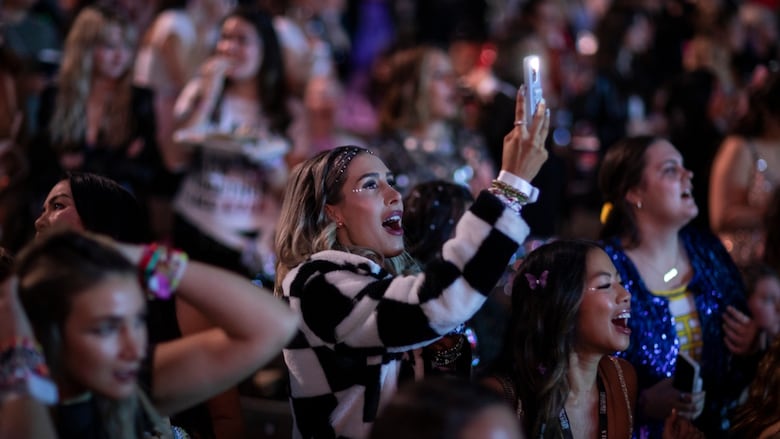Big names are skipping Vancouver on concert tours. Why?
Cost of travel and performing, visa process could be prohibitive, industry expert suggests

Oliver Quezada attends upwards of 20 concerts a year.
"I absolutely love listening to music live," he said.
"Going to these concerts is just such a crazy experience because you grow with an album, you grow with an artist. And seeing it live is like, wow."
But he's noticed a shift in the types of shows coming to B.C.
Bigger artists, people who would play bigger arena shows, are skipping Vancouver.
Lorde, Kendrick Lamar, Charlie XCX, Lady Gaga, Burna Boy — the list goes on — have all overlooked Vancouver on their most recent tours.
Even when Taylor Swift first announced Eras tour dates, Vancouver was initially left out.

"For me personally, one of the big bummers was Kali Uchis with her 'Sincerely, Tour,'" Quezada said.
When there are more than three million people in the Metro Vancouver area, and nearly six million provincewide, would-be concert-goers are left wondering why the city is getting the cold shoulder.
Venues
While there is growing concern about smaller venues for emerging artists in B.C., as more and more close up shop, it has the right stages for bigger acts. Pacific Coliseum in East Vancouver has more than 15,000 permanent seats and can add 2,000 seats on the floor. Rogers Arena has a capacity of up to 19,000 for concerts, according to Ticketmaster. Meanwhile, B.C. Place can seat up to 54,500 people.

B.C. Place manager Chris May said more big concerts were coming to the stadium in recent years, but this year has been slow as they prepare for the FIFA World Cup in 2026.
He said the venue is also mindful of how the tour cycle works.
"When demand is high in Europe or Asia (as it is this year), North America often sees a surge the following year. That's already reflected in our 2026 and 2027 calendars."
Expense
One of the biggest reasons Vancouver is getting shunned by bigger artists is the cost, according to publicist and industry expert Eric Alper.
"When consumers are paying more for groceries or rent, the artists are paying the exact same expenses," he said. That means more money on hotels, dining out, travel and event staffing.
Even duty fees for bringing merch to sell in Canada can be pricey, Alper said.
"These added costs are absolutely a deal breaker when it comes to artists deciding if they're gonna skip or play Canada."
Not to mention the exchange rate — most artists are looking to be paid in American dollars, which means, when the Canadian dollar is weak, the cost of putting on a show goes up for booking agents.
As YVR Concerts founder Angela Vannatter pointed out, it's expensive for people who live there, too.
"The cost of living in Vancouver is so high that buying a concert ticket ... is actually potentially even out of the question," she said.
But that means it's also difficult to afford hotels and travel to other cities to see shows.
Border crossing
If the cost of travel is prohibitive for artists, you may be wondering, well, if they're playing in Seattle, it's not that difficult for them to get up to Vancouver for a show the next day.
Think again, Alper said.
He said there are complex visa requirements for artists every time they cross the border. Getting those visas can be expensive and time-consuming, and not worth it for the artist and their team.
"Even though we are and claim to be a very, very friendly neighbour to the U.S., there's a lot of paperwork and there's a lot of added expenses on top of the usual fees of just trying to get over the border," Alper said.
Border crossing might be difficult for concert-goers, too, Vannatter said, due to the tensions and uncertainty between Canada and the U.S. right now.
"It's really upsetting as a fan."
Support local musicians
If your favourite international pop star isn't coming to an arena near you, consider seeing some local talent instead.
"The one big benefit that I'm hoping [for] when there's a lack of American or U.K. artists coming here is that the Canadian music industry, all of us, will put more emphasis on Canadian artists," Alper said.
Vannatter said there are lots of homegrown musicians who sound similar to big names.
"Chances are, they're writing about an experience that you can relate to and understand. And having understanding amongst ourselves is the most important thing for community."
Even Quezada, who loves a big show, has been trying to check out smaller gigs lately.
"I've been having such a fun time, and it's definitely a different perspective on concerts," he said.
But he's still feeling slighted by Kali Uchis.
"The only thing is that these artists that I really do want to see are popular for a reason."
